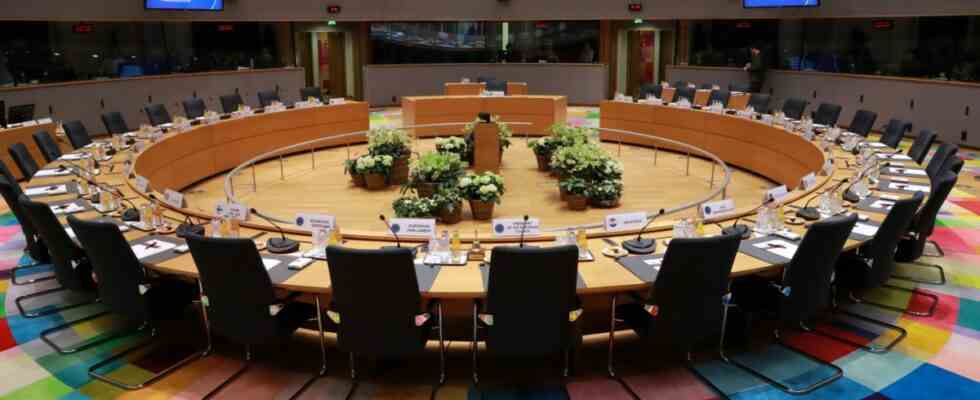Volodymyr Zelensky was in London on Wednesday and wanted to fly to Paris from there. The Ukrainian president, who had only left his country for a short visit to Washington since the beginning of the Russian invasion, had arrived “surprisingly,” the media said. It was true: the general public in Britain and France had no idea that Zelensky was coming.
Zelensky is expected in Brussels this Thursday at the EU. A speech to the European Parliament and a meeting with the 27 heads of state and government of the Union, who are in the city for a summit, are planned. Unlike London and Paris, however, Zelensky’s visit to Brussels has been common knowledge for days. Overzealous employees of the European Parliament told journalists about it on Monday – an embarrassing breach of security protocol.
There will be no fast-track EU membership
Zelensky’s journey is also fraught with question marks in other respects. Because the heads of the EU – Commission President Ursula von der Leyen and Council President Charles Michel – were only last week at a summit in Kyiv. EU officials say that whatever aid the Union currently has available for Ukraine was promised on this occasion – nothing new is to be expected. At the press conference after the talks in Kyiv, Zelensky did not give the impression that he really wanted to go to Brussels immediately. One explanation, therefore, is that Zelensky’s visit flatters the ego of Council President Michel, who invited him. As far as political importance is concerned, Michel is in a certain competition with Commission President von der Leyen. She, in turn, has a close relationship with Zelensky.
On the other hand, the visit to Brussels is also an opportunity for the Ukrainian President to thank the EU and Europe’s taxpayers for their billions in help in the fight against the Russian invaders. It was therefore foreseeable that Selensky would come to Brussels at some point. Now he will not only get an appearance in the European Parliament, but also talk time with the heads of state and government who will decide on assistance to Ukraine.
Selensky will probably not be able to take many new political gifts home with him from Brussels. The fast-track admission to the EU by 2024 that he is calling for will not happen – Zelensky received this message in Kyiv last week. The EU is so divided internally on two other demands from Kiev that rapid progress is also unlikely.
On the one hand, it is about the assets of the Russian central bank that are frozen in accounts in the EU. According to Brussels, it is more than 300 billion euros. Kyiv wants this money to be handed over to Ukraine to pay for repairs to war damage or care for refugees.
Ukraine supporters in Eastern Europe see the situation very differently
However, there are considerable political and legal concerns in a number of EU countries – including Germany. Simply expropriating Russian state assets and giving them to Ukraine would contradict the principle of state immunity under international law. However, the federal government vehemently refers to this principle again and again, for example in the dispute with Italy, Greece or Poland over world war reparations. If EU states were to confiscate Russian central bank money, what would then prevent the governments in Rome, Athens or Warsaw from confiscating German state assets, such as a Goethe Institute? Even France, with its colonial history, is probably not keen on creating a precedent that undermines state immunity.
The Ukraine supporters in Eastern Europe, on the other hand, see the situation completely differently: in a letter this week, the heads of government of Estonia, Latvia, Lithuania and Poland expressly called on their colleagues to be “more creative” at the summit meeting and to find ways to transfer Russia’s central bank assets to Ukraine. “These frozen assets must be used as soon as possible,” the letter said Süddeutsche Zeitung present.
Another point of contention is the special tribunal demanded by Kyiv to try those responsible for the Russian attack on Ukraine – including President Vladimir Putin. How this can be organized legally is controversial. A possible solution would be a large majority in the United Nations General Assembly voting in favour. But diplomats doubt that this majority will come about. In addition – keyword precedent – such a majority could then also approve a special tribunal investigating, for example, the US attack on Iraq. Washington would hardly approve of that.
The draft for the final declaration of the EU summit is therefore kept vague on both topics. The Union will continue to work on solutions for the frozen Russian money and the special tribunal, it is said – a typical formulation intended to whitewash differences of opinion. If Zelenskiy leaves Brussels rather dissatisfied, it would therefore not be a surprise.

